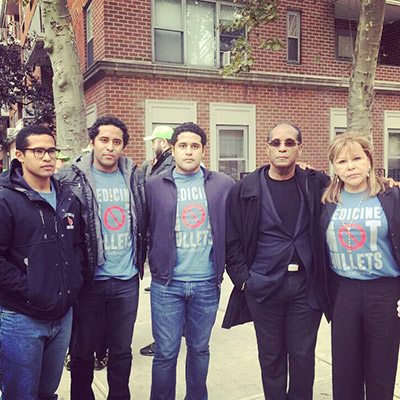Public health student, family call for change in mental health care

By Sally Crocker
Ever since his older brother was shot in a hospital emergency room, Dominique Pean and his family have sought to dispel misconceptions about mental health and to highlight gaps in the health care system that fail patients and their families.
Pean, a Master of Public Health student in UNTHSC’s School of Public Health, recently shared his family’s experiences during an Interprofessional Education (IPE) event on campus. He and his family have launched a national effort to champion change, appearing in the New York Times, Huffington Post, This American Life podcasts, and TV shows like Dr. Oz.
With a history of depression, anxiety and bipolar disorder, Alan Pean, a 26-year-old college student, had become increasingly paranoid and delusional leading up to the night he sped to the ER seeking help.
After crashing his car into other vehicles in the hospital parking lot, an injured and confused Alan screamed for help from the aliens he believed were chasing him.
As his injuries were being assessed, and as he was being observed prior to a psychiatric evaluation, Alan’s behavior turned more bizarre and dangerous. Two off-duty police officers serving as hospital security responded. As they fought to restrain him, Alan was shocked by a Taser and shot in the chest.
Alan Pean survived his injuries, and today his family is on a mission to change perceptions of mental illness, especially within health care settings.
Pean’s father is a physician, his mother works in health care administration, and his brother Chris recently completed his medical degree and is pursuing an orthopedic surgery residency at NYU.
During a panel discussion at the campus IPE event, Pean family members took questions and helped students look at some of the far-reaching issues related to mental health, racial inequity, security and protocol, patient safety, communications and administrative/legal response.
“The system broke down for Alan, and my brother’s case isn’t an isolated one,” Dominique Pean said. “We see situations like this occurring in other cities and communities around the country, and it’s our hope that by sharing this personal story, my family can help champion change around improved care, management and policy for mental health patients.
“Those in health care and public health professions are in a good place to make change,” he said. “We want to help make sure something like this doesn’t happen to anyone ever again.”



![Uyen Sa Nguyen Scaled[58]](https://www.unthsc.edu/newsroom/wp-content/uploads/sites/16/Uyen-Sa-Nguyen-scaled58-145x175.jpg)

Social media